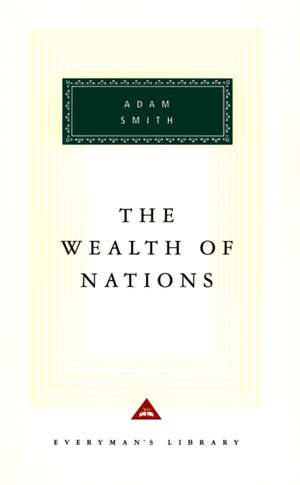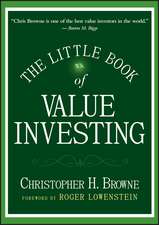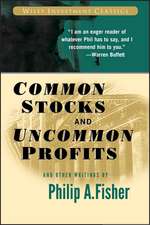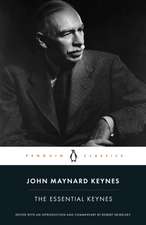The Wealth of Nations: Everyman's Library Classics & Contemporary Classics, cartea 0011
Autor Adam Smithen Limba Engleză Hardback – 30 sep 1991
Published in 1776, in the same year as the Declaration of Independence, The Wealth of Nations has had an equally great impact on the course of modern history. Adam Smith’s celebrated defense of free market economies was written with such expressive power and clarity that the first edition sold out in six months. While its most remarkable and enduring innovation was to see the whole of economic life as a unified system, it is notable also as one of the Enlightenment’s most eloquent testaments to the sanctity of the individual in his relation
to the state.
(Book Jacket Status: Jacketed)
| Toate formatele și edițiile | Preț | Express |
|---|---|---|
| Paperback (25) | 37.72 lei 22-36 zile | +26.36 lei 6-12 zile |
| WORDSWORTH EDITIONS LTD – 9 iul 2012 | 37.72 lei 22-36 zile | +26.36 lei 6-12 zile |
| Bantam Classics – 4 mai 2003 | 55.70 lei 22-29 zile | +30.38 lei 6-12 zile |
| CREATESPACE – | 59.50 lei 22-36 zile | |
| Penguin Books – 6 oct 1999 | 72.57 lei 25-31 zile | +30.59 lei 6-12 zile |
| Hackett Publishing Company – 15 noi 1993 | 83.07 lei 22-36 zile | +19.50 lei 6-12 zile |
| Penguin Books – 24 feb 1982 | 83.81 lei 22-36 zile | +16.32 lei 6-12 zile |
| CreateSpace Independent Publishing Platform – | 105.84 lei 22-36 zile | |
| CreateSpace Independent Publishing Platform – | 154.86 lei 22-36 zile | |
| Prometheus Books – 30 noi 1991 | 176.80 lei 22-36 zile | |
| CREATESPACE – 31 ian 2009 | 185.03 lei 22-36 zile | |
| – | 185.18 lei 22-36 zile | |
| CREATESPACE – | 193.48 lei 22-36 zile | |
| CREATESPACE – | 270.42 lei 22-36 zile | |
| CREATESPACE – | 168.54 lei 43-57 zile | |
| CreateSpace Independent Publishing Platform – 29 noi 2015 | 184.35 lei 43-57 zile | |
| COSIMO CLASSICS – 31 oct 2007 | 186.48 lei 43-57 zile | |
| Simon & Brown – 31 oct 2010 | 215.37 lei 38-44 zile | |
| Simon & Brown – 30 iun 2011 | 215.37 lei 38-44 zile | |
| Simon & Brown – 2 oct 2018 | 216.59 lei 38-44 zile | |
| Simon & Brown – 5 noi 2018 | 218.60 lei 38-44 zile | |
| Cedar Lake Classics – 17 aug 2020 | 222.03 lei 43-57 zile | |
| Simon & Brown – 20 noi 2018 | 226.35 lei 38-44 zile | |
| Bottom of the Hill Publishing – 31 dec 2010 | 239.38 lei 43-57 zile | |
| Simon & Brown – 31 dec 2011 | 243.86 lei 38-44 zile | |
| Start Classics – 26 mar 2024 | 298.45 lei 38-44 zile | |
| Hardback (17) | 117.76 lei 22-36 zile | +28.74 lei 6-12 zile |
| – | 154.93 lei 3 zile | |
| EVERYMAN – 25 sep 1991 | 117.76 lei 22-36 zile | +28.74 lei 6-12 zile |
| Prakash Books – 13 dec 2023 | 181.23 lei 22-36 zile | |
| KUPERARD (BRAVO LTD) – 2000 | 196.80 lei 22-36 zile | +48.23 lei 6-12 zile |
| HARRIMAN HOUSE LTD – 30 apr 2007 | 212.26 lei 22-36 zile | |
| Aatos Editions – 12 dec 2024 | 218.45 lei 25-31 zile | +118.68 lei 6-12 zile |
| Hackett Publishing Company – 15 noi 1993 | 226.34 lei 22-36 zile | |
| 12th Media Services – 18 ian 2018 | 188.90 lei 43-57 zile | |
| IAP LLC – 30 noi 2020 | 212.36 lei 43-57 zile | |
| – | 269.21 lei 38-44 zile | |
| Simon & Brown – oct 2018 | 269.77 lei 38-44 zile | |
| Simon & Brown – 5 noi 2018 | 270.99 lei 38-44 zile | |
| Simon & Brown – 20 noi 2018 | 287.70 lei 38-44 zile | |
| – | 297.69 lei 38-44 zile | |
| COSIMO CLASSICS – 31 oct 2007 | 308.37 lei 43-57 zile | |
| Start Classics – 26 mar 2024 | 353.60 lei 38-44 zile | |
| Engage Books – 2 feb 2021 | 416.00 lei 43-57 zile |
Din seria Everyman's Library Classics & Contemporary Classics
-
 Preț: 239.56 lei
Preț: 239.56 lei -
 Preț: 181.46 lei
Preț: 181.46 lei -
 Preț: 155.68 lei
Preț: 155.68 lei -
 Preț: 152.82 lei
Preț: 152.82 lei -
 Preț: 291.22 lei
Preț: 291.22 lei -
 Preț: 156.56 lei
Preț: 156.56 lei -
 Preț: 140.00 lei
Preț: 140.00 lei -
 Preț: 155.68 lei
Preț: 155.68 lei -
 Preț: 176.42 lei
Preț: 176.42 lei -
 Preț: 141.92 lei
Preț: 141.92 lei -
 Preț: 154.68 lei
Preț: 154.68 lei -
 Preț: 187.87 lei
Preț: 187.87 lei - 8%
 Preț: 562.39 lei
Preț: 562.39 lei -
 Preț: 169.01 lei
Preț: 169.01 lei -
 Preț: 253.70 lei
Preț: 253.70 lei -
 Preț: 129.73 lei
Preț: 129.73 lei -
 Preț: 159.81 lei
Preț: 159.81 lei -
 Preț: 132.00 lei
Preț: 132.00 lei -
 Preț: 194.89 lei
Preț: 194.89 lei -
 Preț: 253.60 lei
Preț: 253.60 lei -
 Preț: 286.18 lei
Preț: 286.18 lei -
 Preț: 129.71 lei
Preț: 129.71 lei -
 Preț: 277.35 lei
Preț: 277.35 lei -
 Preț: 192.29 lei
Preț: 192.29 lei -
 Preț: 180.40 lei
Preț: 180.40 lei -
 Preț: 121.47 lei
Preț: 121.47 lei -
 Preț: 254.91 lei
Preț: 254.91 lei -
 Preț: 177.11 lei
Preț: 177.11 lei -
 Preț: 233.19 lei
Preț: 233.19 lei -
 Preț: 155.90 lei
Preț: 155.90 lei -
 Preț: 144.97 lei
Preț: 144.97 lei -
 Preț: 217.78 lei
Preț: 217.78 lei -
![Les Miserables [With Ribbon Marker]](https://i2.books-express.ro/bs/9780375403170/les-miserables-with-ribbon-marker.jpg) Preț: 283.50 lei
Preț: 283.50 lei -
 Preț: 172.02 lei
Preț: 172.02 lei -
 Preț: 162.49 lei
Preț: 162.49 lei -
 Preț: 218.89 lei
Preț: 218.89 lei -
 Preț: 179.05 lei
Preț: 179.05 lei -
 Preț: 158.19 lei
Preț: 158.19 lei - 8%
 Preț: 439.96 lei
Preț: 439.96 lei -
 Preț: 155.09 lei
Preț: 155.09 lei -
 Preț: 141.27 lei
Preț: 141.27 lei -
 Preț: 181.28 lei
Preț: 181.28 lei -
 Preț: 156.31 lei
Preț: 156.31 lei -
 Preț: 138.16 lei
Preț: 138.16 lei -
 Preț: 141.48 lei
Preț: 141.48 lei -
 Preț: 142.52 lei
Preț: 142.52 lei -
 Preț: 126.43 lei
Preț: 126.43 lei -
 Preț: 201.04 lei
Preț: 201.04 lei -
 Preț: 142.93 lei
Preț: 142.93 lei -
 Preț: 183.26 lei
Preț: 183.26 lei
Preț: 164.15 lei
Nou
31.42€ • 34.14$ • 26.41£
Carte indisponibilă temporar
Specificații
ISBN-10: 067940564X
Pagini: 1184
Dimensiuni: 135 x 209 x 36 mm
Greutate: 0.69 kg
Editura: Everyman's Library
Seria Everyman's Library Classics & Contemporary Classics
Notă biografică
Extras
Adam Smith's ideas fit perfectly with this new democratic, individualistic idea. To him, the "wealth" of a nation wasn't determined by the size of its monarch's treasure or the amount of gold and silver in its vaults, nor by the spiritual worthiness of its people in the eyes of the Church. A nation's wealth was to be judged by the total value of all the goods its people produced for all its people to consume. To a reader at the start of the twenty-first century, this assertion may seem obvious. At the time he argued it, it was a revolutionary democratic vision.
Smith was born in 1723, in the small Scottish port of Kirkcaldy, which sits across the Firth of Forth from Edinburgh. His father was a collector of customs—a job that literally embodied the old mercantilist philosophy that Smith would later argue against. He was educated at the University of Glasgow, whose professors passionately debated the new concepts of individualism and ethics (one of his teachers, Francis Hutcheson, was prosecuted by the Scottish Presbyterian church for spreading the "false and dangerous" doctrines that moral goodness could be obtained by promoting happiness in others and that it was possible to know good and evil without knowing God), and then at Oxford, whose professors didn't debate or teach much of anything. In fact, the lassitude of Oxford's dons prompted Smith to suggest, in The Wealth of Nations, that professors be paid according to the number of students they attract, thereby motivating them to take a more lively interest in teaching—one of Smith's few suggestions with which today's tenured professors of economics generally disagree.
In 1748 Smith returned to the University of Glasgow, first as a professor of logic and then of moral philosophy, filling Francis Hutcheson's chair. There he published The Theory of Moral Sentiments in 1759, which brought him instant fame. In it, Smith asked how a normal self-interested person is capable of making moral judgments, when the essence of morality is selflessness. It was a question that troubled many of the new thinkers of the eighteenth century, who had liberated themselves from both theology and codes of aristocratic or chilvaric virtue. Smith's answer foreshadowed Sigmund Freud's superego: People possess within themselves an "impartial spectator" who advises them about moral behavior.
Smith resigned his professorship in 1764 to become tutor to the son of the late Duke of Buccleuch. The boy's mother, Countess of Dalkeith, had just remarried Charles Townshend, one of Smith's many admirers, who later became Britain's chancellor of the exchequer, and was responsible for imposing the taxes on the American colonies that prompted some Bostonians to throw large quantities of tea into Boston Harbor. For the next two years, Smith traveled throughout the Continent, beginning work on the book that was to become The Wealth of Nations. He visited Voltaire in Geneva, and in Paris met François Quesnay, a physician in the court of Louis XV who had devised a chart of the economy—a "tableau economique" he called it—showing the circulation of products and money in an economy analogous to the flow of blood through a body. Quesnay and his fellow Physiocrats believed that wealth came from a nation's production that enlarged the flow rather than from its accumulation of gold and silver, as the prevailing mercantilists believed, and that governments should therefore remove all impediments to the flow of money and goods in order to increase production.
Smith took these notions to heart, although he didn't agree with everything the Physiocrats propounded (such as their view that agricultural production was the only true source of wealth). Returning to Glasgow in 1766, he spent the better part of the following decade working out his theories. Occasionally he'd travel to London to discuss them with luminaries such as the philosopher Edmund Burke, historian Edward Gibbon, Benjamin Franklin (visiting from America), and the remarkable personalities Samuel Johnson and James Boswell. Smith's book finally appeared on March 9, 1776, in two volumes, and went through several subsequent editions. It was well received, although not an immediate sensation. Smith spent his remaining years back in Edinburgh as commissioner of customs, the same kind of mercantilist sinecure his father had held, and died in July 1790, at the age of sixty-seven.
The Wealth of Nations is resolutely about human beings—their capacities and incentives to be productive, their overall well-being, and the connection between productivity and well-being. In the very first sentence of his Introduction, Smith takes aim at the mercantilists and declares, "The annual labour of every nation is the fund which originally supplies it with all the necessaries and conveniences of life. . . ." And two paragraphs later he states that a nation's wealth grows because of "the skill, dexterity, and judgment with which its labour is generally applied. . . ." Smith's concern about all of a nation's working people is evident. In a wealthy nation "a workman, even of the lowest and poorest order, if he is frugal and industrious, may enjoy a greater share of the necessaries and conveniences of life than it is possible for any savage to acquire." In the rest of the book he explains why this is so.
While The Theory of Moral Sentiments showed how normal, self-interested people could make moral judgments by consulting an internal "impartial spectator," in The Wealth of Nations Smith explains how such people will automatically contribute to the well-being of others even absent such consultations, simply by pursuing their own ends. "It is not from the benevolence of the butcher, the brewer, or the baker, that we expect our dinner," writes Smith, in one of the most frequently cited passages in the history of economic thought, "but from their regard to their own interest. We address ourselves, not to their humanity but to their self-love. . . ." With several strokes of his pen, Smith thereby provided a moral justification for motives that had been morally suspect in Western thought for thousands of years.
How can self-interested behavior—the "private interests and passions" of men Smith calls them—lead to the good of the whole? By means, he says, of an "invisible hand"—perhaps the most famous, or infamous, bodily metaphor in all of social science. By an "invisible hand" Smith does not mean a mystical force; he is referring to an unfettered market propelled both by competition among self-interested sellers and by buyers seeking the best possible deals for themselves. If sellers produce too little of something to meet buyers' demands, for example, the price of the product will rise until other sellers step in to fill the gap. If some sellers charge too high a price to begin with, others will step in and charge a lower one.
Unimpeded, the invisible hand will allocate goods efficiently. But the key to wealth creation, for Smith, comes in the division of labor—by which individuals specialize in doing or producing a particular thing. Smith famously illustrates this principle by reference to the making of pins within the kind of small factory that characterized the early years of the Industrial Revolution. "One man draws out the wire, another straights it, a third cuts it, a fourth points it, a fifth grinds it at the top for receiving the head; to make the head requires two or three distinct operations . . . ," he explains. "I have seen a small manufactory of this kind where ten men only were employed . . . [who] could make among them upwards of forty-eight thousand pins a day." He contrasts this with the likely output of individuals who tried to make the entire pins themselves. "[I]f they had all wrought separately and independently . . . they certainly could not each of them have made twenty, perhaps not one pin in a
day. . . ."
Specialization improves productivity because it allows workers to become more skilled in their specific tasks, motivates them to discover more efficient means of doing them, and saves them the time of changing over to different tasks. Here, Smith noticed something that modern managers often overlook: Innovation often begins with the workers closest to the things being worked upon. "A great part of the machines made use of in those manufactures in which labour is most subdivided, were originally the inventions of common workmen, who, being each of them employed in some simple operation, naturally turned their thoughts towards finding out easier and readier methods of performing it."
In order to reap the full benefits of specialization, the market must be sufficiently large. After all, there's little point in creating forty-eight thousand pins if there aren't enough people to buy them. The larger the market, the greater the opportunities for specialization. It follows that barriers to trade, within a nation or between nations—regulations, licenses, tariffs, quotas, and other market protections—reduce potential wealth. At the extreme, the necessity of self-sufficiency causes hardship, as in "the lone houses and very small villages which are scattered about in so desert a country as the Highlands of Scotland, [where] every farmer must be butcher, baker, and brewer for his own family."
From the Trade Paperback edition.
Recenzii
--Robert L. Heilbroner
From the Trade Paperback edition.
Descriere
Adam Smith (1723-1790) was one of the brightest stars of the eighteenth-century Scottish Enlightenment. An Inquiry into the Nature and Causes of the Wealth of Nations was his most important book. First published in London in March 1776, it had been eagerly anticipated by Smith's contemporaries and became an immediate bestseller.
That edition sold out quickly and others followed. Today, Smith's Wealth of Nations rightfully claims a place in the Western intellectual canon. It is the first book of modern political economy, and still provides the foundation for the study of that discipline.
But it is much more than that. Along with important discussions of economics and political theory, Smith mixed plain common sense with large measures of history, philosophy, psychology, sociology, and much else. Few texts remind us so clearly that the Enlightenment was very much a lived experience, a concern with improving the human condition in practical ways for real people.
A masterpiece by any measure, Wealth of Nations remains a classic of world literature to be usefully enjoyed by readers today.

























